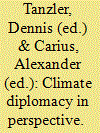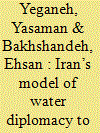| Srl | Item |
| 1 |
ID:
193563


|
|
|
|
|
| Publication |
Berlin, Berliner Wissenschafts-Verlag, 2012.
|
| Description |
143p.pbk
|
| Standard Number |
9783830530558
|
|
|
|
|
|
|
|
|
|
|
|
Copies: C:1/I:0,R:0,Q:0
Circulation
| Accession# | Call# | Current Location | Status | Policy | Location |
| 060488 | 363.5492056/TAAN 060488 | Main | On Shelf | General | |
|
|
|
|
| 2 |
ID:
113672


|
|
|
|
|
| Publication |
New Delhi, IDSA, 2012.
|
| Description |
xiii, 335p.
|
| Standard Number |
9788182746572
|
|
|
|
|
|
|
|
|
|
|
|
Copies: C:2/I:0,R:0,Q:0
Circulation
| Accession# | Call# | Current Location | Status | Policy | Location |
| 056691 | 355.033054/VEN 056691 | Main | On Shelf | General | |
| 056692 | 355.033054/VEN 056692 | Main | On Shelf | General | |
|
|
|
|
| 3 |
ID:
111673


|
|
|
| 4 |
ID:
186389


|
|
|
|
|
| Summary/Abstract |
Many countries of the world are suffering from the adverse consequences of water scarcity. The United Nations has estimated that, by the middle of the present century, about 7 billion people in 48 countries, mostly from Southwest Asia, will encounter water scarcity. This may be expedited by the adverse consequences of climate change and global warming which would escalate the risk of war and conflict over transboundary resources. The present research explores the ways water diplomacy can mitigate the dire effects of water scarcity and promote “treaty making” and “institution building” as well as multilateral cooperation on shared waters. The focus is on Iran's water diplomacy with neighboring countries over transboundary resources to forge cooperation and hamper conflict. Our findings suggest that Iran's water diplomacy is constructed on principles of “goodwill and cooperation,” “non-significant harm,” “environmental protection,” and “exchange of data and information” on shared water resources with its neighboring riparian states. Such a model, which has resulted in no dispute between Iran and some of its neighbors such as Pakistan, Turkmenistan, and Armenia in recent years, demonstrates the broader benefits of Iran's approach to water diplomacy and paves the way for stronger cooperation in other areas of mutual interest. Additionally, it encourages multilateral engagement and “hydrosolidarity” within the framework of agreements and the formation of joint “water commissions” for the equitable and reasonable distribution of water among riparian states in line with the 1997 UN Watercourses Convention.
|
|
|
|
|
|
|
|
|
|
|
|
|
|
|
|
| 5 |
ID:
183796


|
|
|
|
|
| Summary/Abstract |
This article investigates how China's new policies and practices toward water issues in the Mekong subregion are reshaping hydropolitics and geopolitics. Despite its unmatched hard powers in the region, China suffers from a lack of soft powers in regional geopolitics generally and the transboundary hydropolitics particularly. As the Mekong water conflict emerges as a major source of regional concerns toward its rise, China has been adopting water diplomacy in the Mekong subregion under the auspices of the newly established Lancang Mekong Cooperation (LMC) to consolidate its position as both the hydro-hegemon and regional power. On the one hand, China's water diplomacy aims to increase the country's persuasive and ideational powers to consolidate its status as the hydro-hegemon in the Mekong River Basin. On the other hand, China is also interested in exporting its development approach and promoting the common identity among regional countries through water diplomacy. Although these efforts have boosted its geopolitical cloud in the Mekong to some degree, China's regional expansion has triggered counterefforts from both the Mekong countries and other major powers.
|
|
|
|
|
|
|
|
|
|
|
|
|
|
|
|